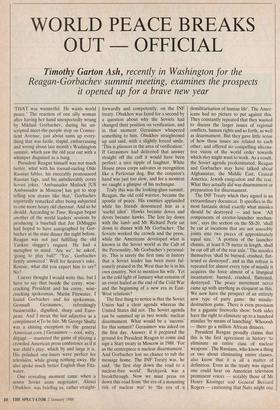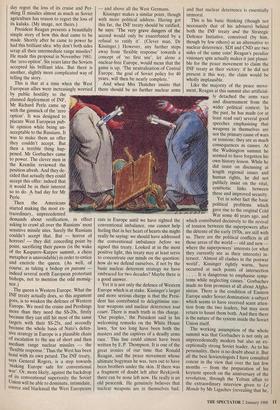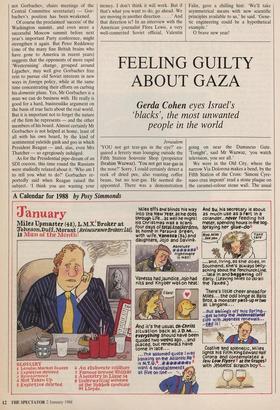WORLD PEACE BREAKS OUT OFFICIAL
Timothy Garton Ash, recently in Washington for the
Reagan-Gorbachev summit meeting, examines the prospects it opened up for a brave new year
'THAT was wunnerful. He wants world peace.' The reaction of one silly woman after having her hand unexpectedly wrung by Mikhail Gorbachev, during his un- scripted meet-the-people stop on Connec- ticut Avenue, just about sums up every- thing that was facile, stupid, embarrassing and wrong about last month's Washington summit, which saw the old year out with a whimper disguised as a bang.
President Reagan himself was not much better, what with his toenail-curling Olde Russian fables, his execrably pronounced Russian tags, and his unbelievably corny Soviet jokes. 'Ambassador Matlock [US Ambassador in Moscow] has got to stop telling you stories like that,' Gorbachev reportedly remarked after being subjected to one more hoary old chestnut. And so he should. According to Time, Reagan began another of the world leaders' sessions by producing 'a baseball that Joe DiMaggio had hoped to have autographed by Gor- bachev at the state dinner the night before. Reagan was not just fulfilling the old Yankee slugger's request. He had a metaphor in mind. 'Are we', he asked, 'going to play ball?"Yes', Gorbachev firmly answered.' Well for heaven's sake, Ronnie, what did you expect him to say? No?
I never thought I would write this, but I have to say that beside the corny, wise- cracking President and his corny, wise- cracking spokesman, Marlin Fitzwater, I found Gorbachev and his spokesman, Gennadi Gerasimov, refreshingly businesslike, dignified, sharp and Euro- pean. And I mean the last adjective as a compliment.*(To be fair, Mr George Shultz was a shining exception to the general American corn.) Gerasimov — cool, witty, &gage — mastered the game of playing a crowded American press conference as if it was child's play, which by and large it is. His polished one-liners were perfect for television, while giving nothing away. He also spoke much better English than Fitz- water.
One revealing moment came when a senior Soviet arms negotiator, Alexei Obukhov, was briefing us, rather straight- forwardly and competently, on the INF treaty. Obukhov was fazed for a second by a question about why the Soviets had changed their position on verification, and in that moment Gerasimov whispered something to him. Obukhov straightened up and said, with a slightly forced smile. 'This is glasnost in the area of verification.' If Gerasimov had delivered that answer straight off the cuff it would have been perfect: a nice ripple of laughter, White House press corps salivates in recognition like a Pavlovian dog. But the conjuror's hand was just too slow, and for a moment we caught a glimpse of his technique.
Truly this was the looking-glass summit. Reagan, the old cold warrior, became the apostle of peace. His enemies applauded while his friends denounced him as a `useful idiot'. Hawks became doves and doves became hawks. The lion lay down with the lamb and Mr Richard Perle sat down to dinner with Mr Gorbachev. The Soviets worked the crowds and the press, while the Americans developed what is known in the Soviet world as the Cult of the Personality, Mr Gorbachev's personal- ity. This is surely the first time in history that a Soviet leader has been more ful- somely praised in the West than he is in his own country. Not to mention his wife. Yet in the cold light of January what remains of an event hailed as the end of the Cold War and the beginning of a new era in East- West relations?
The first thing to notice is that the Soviet Union had a clear agenda whereas the United States did not. The Soviet agenda can be summed up in two words: nuclear disarmament. What would be a 'success' for this summit? Gerasimov was asked on the first day. Answer: if it prepared the ground for President Reagan to come and sign a Start treaty in Moscow in 1988. 'For us the centrepiece is nuclear disarmament.' And Gorbachev lost no chance to rub the message home. The INF Treaty was, he said, 'the first step down the road to a nuclear-free world'. Reykjavik was a breakthrough. Now we must press on down this road from 'the era of a mounting risk of nuclear war' to 'the era of a demilitarisation of human life'. The Amer- icans had no picture to put against this. They constantly repeated that they wanted to discuss the larger issues of regional conflicts, human rights and so forth, as well as disarmament. But they gave little sense of how these issues are related to each other, and offered no compelling alterna- tive vision of the world order towards which they might want to work. As a result, the Soviet agenda predominated. Reagan and Gorbachev may have talked about Afghanistan, the Middle East, Central America, Jewish emigration and the rest. What they actually did was disarmament or preparation for disarmament.
The INF Treaty which they signed is an extraordinary document. It specifies in the most fantastic detail exactly what missiles should be destroyed — and how. 'All components of erector-launcher mechan- ism', says the section on the SS-20, 'shall be cut at locations that are not assembly joints into two pieces of approximately equal size.' A portion of the launcher chassis, at least 0.78 metre in length, shall be cut off aft of the rear axle.' The missiles themselves 'shall be burned, crushed, flat- tened or destroyed', and as this refrain is repeated for almost every type of missile it acquires the force almost of a liturgical incantation: burned, crushed, flattened, destroyed. The peace movement never came up with anything as eloquent as this. We now have the prospect of an entirely new type of party game: the missile- destruction game. There is even provision for a gigantic fireworks show: both sides have the right to eliminate up to a hundred missiles 'by means of launching'. Wh000sh — there go a million African dinners.
President Reagan proudly claims that this is the first agreement in history 'to eliminate an entire class of nuclear weapons'. The Russians, who know a thing or two about eliminating entire classes, also know that it is all a matter of definition. Even as the treaty was signed one could hear on American television prominent voices — notably those of Mr Henry Kissinger and General Bernard Rogers — cautioning that Nato might one day regret the loss of its cruise and Per- shing II missiles almost as much as Soviet agriculture has reason to regret the loss of its kulaks. (My image, not theirs.) President Reagan presents a beautifully simple story of how this deal came to be made. Shortly after he came to power he had this brilliant idea: why don't both sides scrap all their intermediate range missiles? He made this proposal in November 1981: the 'zero option'. Six years later the Soviets accepted his brilliant idea. But there is another, slightly more complicated way of telling the story.
This is that at a time when the West European allies were increasingly worried by public hostility to the planned deployment of INF, Mr Richard Perle came up with the gimmick of the 'zero option'. It was designed to placate West European pub- lic opinion while being un- acceptable to the Russians. It was to make them an offer they couldn't accept. But then a terrible thing hap- pened. Mr Gorbachev came to power. The clever men in the Kremlin reviewed the position afresh. And they de- cided that actually they could accept this offer: indeed that it would be in their interest so to do. A bad day for Mr Perle.
Then the Americans started making the most ex- traordinary, unprecedented demands about verification, in effect asking to crawl all over the Russians' most sensitive missile sites. Surely the Russians couldn't accept that. But — horror of horrors! — they did: conceding point by point, sacrificing their pawns (in the wake of the Kasparov-Karpov summit, a chess metaphor is unavoidable) in order to entice and encircle the queen. (As well, of course, as taking a bishop en passant indeed several north European protestant bishops, not to mention the odd monsig- nor.) The queen is Western Europe. What the INF treaty actually does, so this argument goes, is to weaken the defence of Western Europe. We need the cruise and Pershings more than they need the SS-20s, firstly because they can still hit most of the same targets with their SS-25s, and secondly because the whole basis of Nato's defen- sive strategy in Europe is a plausible chain of escalation to the use of short and then medium range nuclear missiles — the `flexible response.' Thus the West has been hoist with its own petard. The INF treaty, says General Rogers, is a step towards `making Europe safe for conventional war'. Or, more likely, against the backdrop of its conventional superiority the Soviet Union will be able to dominate, intimidate, coerce and blackmail the West Europeans — and above all the West Germans.
Kissinger makes a similar point, though with more political address. Having got this far, the INF treaty should be ratified, he says: 'The very grave dangers of the accord would only be exacerbated by a refusal to ratify it'. (Clever man, Dr Kissinger.) However, any further steps away from 'flexible response' towards a concept of 'no first use', let alone a nuclear-free Europe, would mean that the game is up. 'The neutralisation of Central Europe, the goal of Soviet policy for 40 years, will then be nearly complete.'
And when Mrs Thatcher insists that there should be no further nuclear arms cuts in Europe until we have righted the conventional imbalance, one cannot help feeling that in her heart of hearts she might really be saying: we should have addressed the conventional imbalance before we signed this treaty. Looked at in the most positive light, this treaty may at least serve to concentrate our minds on the question: how do we defend ourselves, if not by the basic nuclear deterrent strategy we have embraced for two decades? Maybe there is a good answer.
Yet it is not only the defence of Western Europe which is at stake. Kissinger's larger and more serious charge is that the Presi- dent has contributed to delegitimise nuc- lear weapons and nuclear deterrence tout court. There is much truth in this charge. `Our peoples,' the President said in his welcoming remarks on the White House lawn, 'for too long have been both the masters and the captives of a deadly arms race.' This line could almost have been written by E.P. Thompson. It is one of the great ironies of our time that Ronald Reagan, and the peace movement whose ultimate bogyman he was, turn out to have been brothers under the skin. If there was a fragment of doubt left after Reykjavik there can be none left now. He really is an old peacenik. He genuinely believes that nuclear weapons are in themselves bad, and that nuclear deterrence is essentially immoral.
This is his basic thinking (though not necessarily that of his advisers) behind both the INF treaty and the Strategic Defence Initiative, conceived (by him, though by few others) as an alternative to nuclear deterrence. SDI and CND are two sides of the same coin! Reagan's peculiar visionary spin actually makes it just plausi- ble for the peace movement to claim the INF treaty as their victory: if he did not present it this way, the claim would be wholly implausible.
Like the majority of the peace move- ment, Reagan at this summit also artificial- ly detached the arms race and disarmament from the wider political context. In the past, he has made (or at least read out) several good speeches emphasising that weapons in themselves are not the primary cause of wars or tensions: they are as much consequences as causes. At the Washington summit he seemed to have forgotten his own history lesson. While he did insist on discussing at length regional issues and human rights, he did not publicly insist on the vital, symbiotic links between these and improved security.
Yet in sober fact the basic political problems which gave rise to the original Cold War some 40 years ago, and which contributed decisively to the revival of tension between the superpowers after the détente of the early 1970s, are still with us. There are the political conflicts in all those areas of the world — old and new where the superpowers' interests (or what they currently see as their interests) in- tersect. 'Almost all clashes in the postwar world', Kissinger rightly warns, 'have occurred at such points of intersection . . . . It is dangerous to emphasise symp- toms while neglecting causes.' Gorbachev made no firm promises at all about Afgha- nistan. There is the condition of Eastern Europe under Soviet domination: a subject which seems to have received scant atten- tion from the two leaders, but may soon return to haunt them both. And then there is the nature of the system inside the Soviet Union itself.
The working assumption of the whole summit was that Gorbachev is not only an unprecedentedly modern but also an ex- ceptionally strong Soviet leader. As to his personality, there is no doubt about it. But all the best Sovietologists I have consulted concur in the view that over the last few months — from the preparation of his keynote speech on the anniversary of the revolution, through the Yeltsin affair to the extraordinary interview given to Le Monde by Mr Ligachev (revealing that he, not Gorbachev, chairs meetings of the Central Committee secretariat) — Gor- bachev's position has been weakened.
Of course the proclaimed 'success' of the Washington summit, and even more a successful Moscow summit before next year's important Party conference, might strengthen it again. But Peter Reddaway (one of the many fine British brains who have gone to America in recent years) suggests that the opponents of more rapid `Westernising' change, grouped around Ligachev, may well give Gorbachev free rein to pursue old Soviet interests in new ways in foreign policy, while at the same time concentrating their efforts on curbing his domestic plans. Yes, Mr Gorbachev is a man we can do business with. He really is good for a hard, businesslike argument on the basis of true facts about the real world. But it is important not to forget the nature of the firm he represents — and the other members of his board. Almost certainly Mr Gorbachev is not helped at home, least of all with his own board, by the kind of sentimental yuletide gush and goo in which President Reagan — and, alas, even Mrs Thatcher — so egregiously indulged.
As for the Presidential pipe-dream of an SDI cocoon, this time round the Russians were studiedly relaxed about it. 'Who am I to tell you what to do?' Gorbachev re- portedly said when Reagan raised the subject. 'I think you are wasting your money. I don't think it will work. But if that's what you want to do, go ahead. We are moving in another direction . . . .' And that direction is? In an interview with the American journalist Flora Lewis, a very well-connected Soviet official, Valentin Falin, gave a chilling hint. 'We'll take asymmetrical means with new scientific principles available to us,' he said. 'Gene- tic engineering could be a hypothetical example.'
0 brave new year!












































 Previous page
Previous page